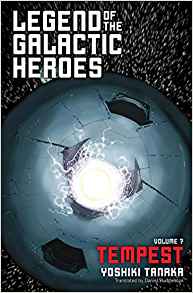 translated by Daniel Huddleston
translated by Daniel Huddleston
August 21, 2018
254 pages
* here be spoilers!
In this latest installment in the Legend of the Galactic Heroes series, Tanaka picks up the pace once again, offering readers space battles, tactical trickery, and meditations on what it takes to be a “successful” ruler. And, of course, there’s the historiographical strain that runs through all of these novels.
Tempest tells the story of Yang Wen-li’s strategic next step involving the recapture of the Iserlohn fortress, which has been captured and recaptured over the years thanks to its important location (between the Free Planets Alliance and the new Lohengramm Dynasty). As usual, Yang succeeds in outmaneuvering the kaiser’s military forces with very little bloodshed, taking control of Iserlohn, thanks in large part to technical booby-traps he left after losing the fortress not too long before. Despite this victory, the Free Planets Alliance itself is overtaken by the kaiser’s army and finally disintegrates, attacked from without by weapons and eaten away from within by political corruption.
Between descriptions of space battles and political maneuvering, though, are passages in which the narrator considers the philosophical underpinnings of different forms of government and the ways in which leaders rise to the top. On the one hand, Reinhard Lohengramm aims to bring peace to the galaxy through “benevolent” authoritarian rule, while Yang Wen-li seeks to restore democratic republicanism despite the system’s tendency to slide into corruption …or authoritarianism. After all, despite everything that has happened to and within the Free Planets Alliance, Yang clings to his belief that human beings are best served by democratic principles, even if that system must be readjusted every so often to correct for the inevitable faults in human nature.
Tanaka makes it very hard to despise Lohengramm, even though the reader is encouraged to not just like, but downright admire, Yang. The narrator makes a point to show the reader Lohengramm’s mercy, patience, and sound judgment, as the kaiser punishes anyone who acts duplicitously or cowardly while raising up those who serve him with honesty and bravery. Lohengramm is presented as a fallible ruler, despite his immense power, and the narrator reminds us several times that the kaiser works best when he has an enemy to take down. Once all of his enemies are vanquished, will he lose his will to rule? Such questions concern both Lohengramm and his inner circle, since the former, so far, has no successor.
In Tempest, we’re asked to think more than ever about what distinguishes Yang from Lohengramm, and if these distinctions can really tell us who is right/good and who is wrong/evil. Tanaka offers us no easy answers, underscoring this relativism with the narrator’s repeated references to historical accounts and texts (written after the events in the series) and his criticisms of those texts, along with commentary about what the narrator really thinks about, for instance, Yang’s strategies and Lohengramm’s personality.
And remember how in the previous book Julian stole a disc from the Church of Terra on Earth? Well, it takes Yang half of the book to finally think to look at it, and what he sees makes him think anew about the power dynamics among the Empire, the former FPA, and Phezzan.
Translator Daniel Huddleston does a fantastic job, as usual, in bringing this story into English, and his sparing yet artful use of American slang keeps the book’s tone from becoming too dark or formal. Conversations and the narrator’s musings sound natural to the Anglophone reader, even though this series was written in Japanese over thirty years ago.
This seventh volume ends on an ominous note, gearing us up for some more intrigue and lavishly-described space battles in the final three books. Onward!
*Read my reviews of Volumes 1, 2, 3, 4, 5, and 6, as well as Charles Tan’s series overview.
